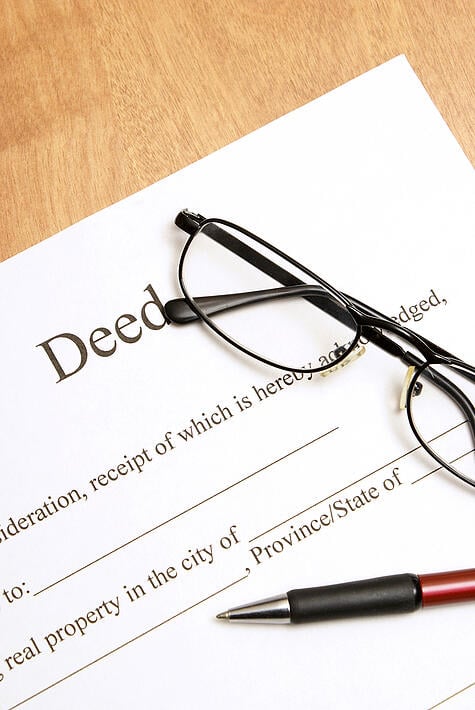
In Massachusetts, there are three types of property deeds used for real estate transactions: warranty deeds, quitclaim deeds and release deeds. Each type of deed in Massachusetts offers varying levels of protection and guarantees against flaws in the title of the transferred real estate. The vast majority of property in Massachusetts is transferred via a quitclaim deed. Home buyers typically receive the same type of deed from a seller that the seller received when purchasing the property.
 Warranty deeds. In Massachusetts, a warranty deed generally offers the greatest protection to someone purchasing or receiving the title to a piece of real estate (the grantee). A warranty deed includes four basic assurances to the grantee at the time of the transaction. The first warranty is the current owner (seller) of the title (the grantor) does own the real estate in fee simple, meaning the grantor has absolute ownership of the property. Second, a warranty deed guarantees the property is free from encumbrances (anything that affects or limits the title of the property, such as easements or liens) except for those expressly stated in the deed. Third, the warranty deed guarantees that the grantor of the title has the legal right to sell or transfer the property to the grantee. Lastly, through the property deed, the grantor promises to defend against any legal claims regarding problems with the title that arose not only during the grantor's ownership period but also before that period.
Warranty deeds. In Massachusetts, a warranty deed generally offers the greatest protection to someone purchasing or receiving the title to a piece of real estate (the grantee). A warranty deed includes four basic assurances to the grantee at the time of the transaction. The first warranty is the current owner (seller) of the title (the grantor) does own the real estate in fee simple, meaning the grantor has absolute ownership of the property. Second, a warranty deed guarantees the property is free from encumbrances (anything that affects or limits the title of the property, such as easements or liens) except for those expressly stated in the deed. Third, the warranty deed guarantees that the grantor of the title has the legal right to sell or transfer the property to the grantee. Lastly, through the property deed, the grantor promises to defend against any legal claims regarding problems with the title that arose not only during the grantor's ownership period but also before that period.
Quitclaim deeds. Quitclaim deeds, the most common type in Massachusetts, differ from warranty deeds because the assurances are more limited. The first assurance a quitclaim deed makes is similar to the second warranty deed guarantee, which states the grantor of the title has not encumbered the property other than explicitly mentioned in the deed. Unlike a warranty deed, the quitclaim deed only covers encumbrances made by the grantor. It does not cover any preexisting encumbrances such as easements or restrictions set forth by the municipality. In addition to the first assurance, the quitclaim deed guarantees that the grantor will defend against any legal claims regarding problems with the title that arose during the grantor's ownership but not prior to the grantor's ownership. Essentially a quitclaim deed provides the same protections as a warranty deed, except it limits how far back in time the grantor is liable for any problems resulting from the title.
Related: How Unmarried Couples Hold Real Estate in Massachusetts
Release deeds. The third type of deed used in Massachusetts, the release deed, offers the least protection to homebuyers for real estate transactions. A release deed does not guarantee anything and merely serves to transfer a title or whatever right the grantor holds to a specific property. With a release deed, the grantor does not need to assure the title is valid; thus, it ultimately provides no assurances whatsoever.
Typically, the seller's attorney drafts the real estate deed in Massachusetts, and there are specific drafting requirements. In addition, the registry of deeds prescribes various formatting conditions.
Regardless of the type of deed in Massachusetts, it must include the consideration or purchase price paid. The purchase price is used to calculate transfer taxes (known as tax stamps), which the seller pays.
Related: Important Real Estate Terms and Definitions
Every deed must adequately describe the property conveyed, including boundaries. The deed may state easements, restrictions, covenants, or takings on the property. The deed also will reference the last prior deed to track ownership.
A notary public must notarize all property deeds. The notary public must verify the sellers' identification through a state-issued driver's license or another acceptable form of identification. The notary must also confirm that the sellers are signing the deed voluntarily (by their own free act and will).
The registry of deeds charges a $155 recording fee, which the buyer pays, to record the deed.
The information on this Web site is not legal advice but for informational purposes only. Please read the full disclaimer and contact a licensed real estate attorney. Please review our frequently asked questions section carefully or contact us anytime to set up a free, no-obligation consultation. You can meet us and learn more about how we assist homebuyers in purchasing real estate. Call (978.835.5906) anytime to schedule an in-person or online meeting or read about our brokers online.
Home Buyer Resources
First-time Home Buyer Programs

Client: Kailee C.
"I really valued the level of professionalism and reliability that [he] consistently maintained. Further, I appreciated the timely manner in which he responded to my questions ..."
Client: Oksana P.
"No pressure approach made the process much easier ... in spite of an aggressive moving timeline."
Client: Geneva R.
"The service Buyers Brokers Only, LLC provided was truly invaluable to us in finding our first home. We couldn't be happier!"
Client: Mark V. & Laura V.
"It was an absolute pleasure to work with ... Buyers Brokers Only, LLC. There is absolutely no reason to use anyone else."

Call / Text (978) 835-5906